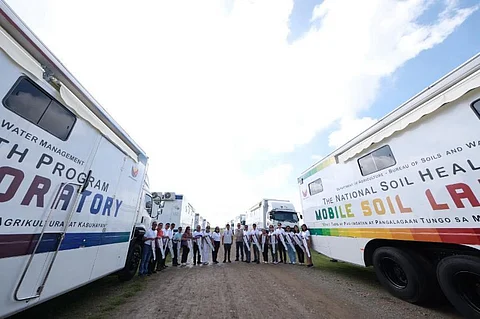
- NEWS
- the EDIT
- COMMENTARY
- BUSINESS
- LIFE
- SHOW
- ACTION
- GLOBAL GOALS
- SNAPS
- DYARYO TIRADA
- MORE

In a strategic move to industrialize the country’s rice production and expand farmers’ access to value-added markets, the Department of Agriculture (DA) rolled out P95.1 million worth of farm equipment and post-harvest systems in Nueva Ecija, signaling a shift from subsistence farming to scalable agri-business.
The new investment — highlighted by a state-of-the-art Rice Processing System (RPS) valued at over P64 million and complemented by P31.1 million worth of tractors and harvesters — is expected to enhance operational efficiency for more than 6,000 rice farmers across nearly 10,000 hectares of farmland. By improving farmers' ability to mill, package, and market their own produce, the DA aims to reduce post-harvest losses while increasing income margins.
Funded through the Rice Competitiveness Enhancement Fund (RCEF), the RPS can process up to three metric tons of palay per hour and represents a wider thrust to modernize the country’s agri value chain.
“This isn’t just machinery. It’s the lifeline of a more modern, self‑reliant agriculture sector,” said Agriculture Secretary Francisco Tiu Laurel Jr. He added that the RCEF’s allocation will triple to P30 billion from 2026 to 2031 to bring similar systems and additional support to other rice-producing provinces.
Beyond equipment, the DA also introduced mobile soil laboratories — one for each of the country’s 16 regions — as part of a data-driven approach to optimizing yield and input efficiency. Since its December pilot launch in Region III, the first lab has already served over 1,500 farmers in 42 municipalities, issuing 362 soil-health cards and five fertility maps.
Recognizing innovation and resilience in the agriculture sector, the day’s events also featured the 50th Gawad Saka Awards, where 43 national champions — including farmers, fishers, researchers, youth advocates, and institutions — were honored. Awardees received grants and cash prizes ranging from P150,000 to P3 million, in support of their sustainable practices and contributions to agricultural advancement.
Further strengthening the local value chain, the National Food Authority also reopened a refurbished warehouse in Cabanatuan City following a P17.9-million upgrade. The facility, now capable of storing up to 193,000 bags of rice, expands the NFA’s buffer-stocking capacity and is expected to improve farm-gate access and fair pricing for local palay producers.
